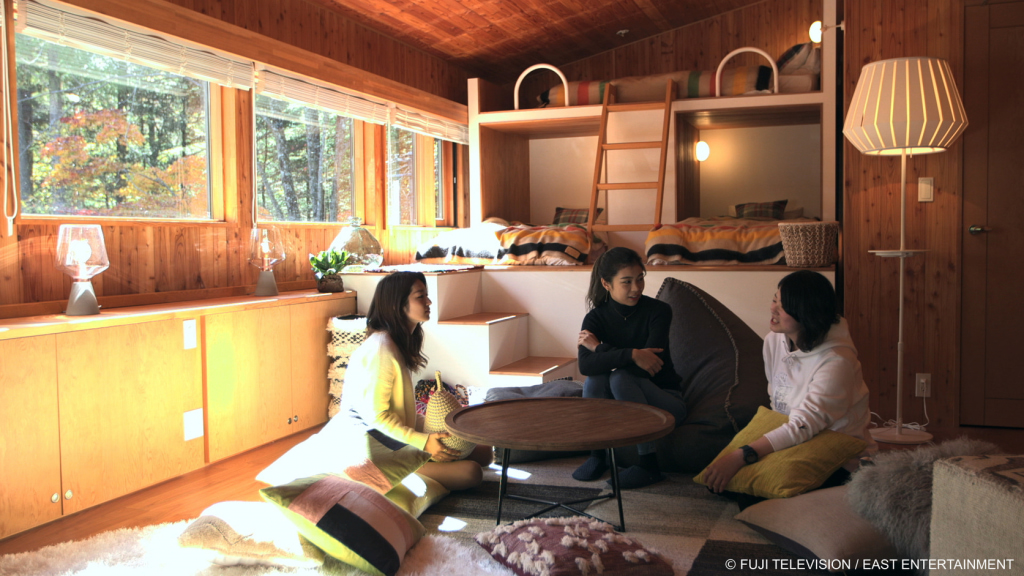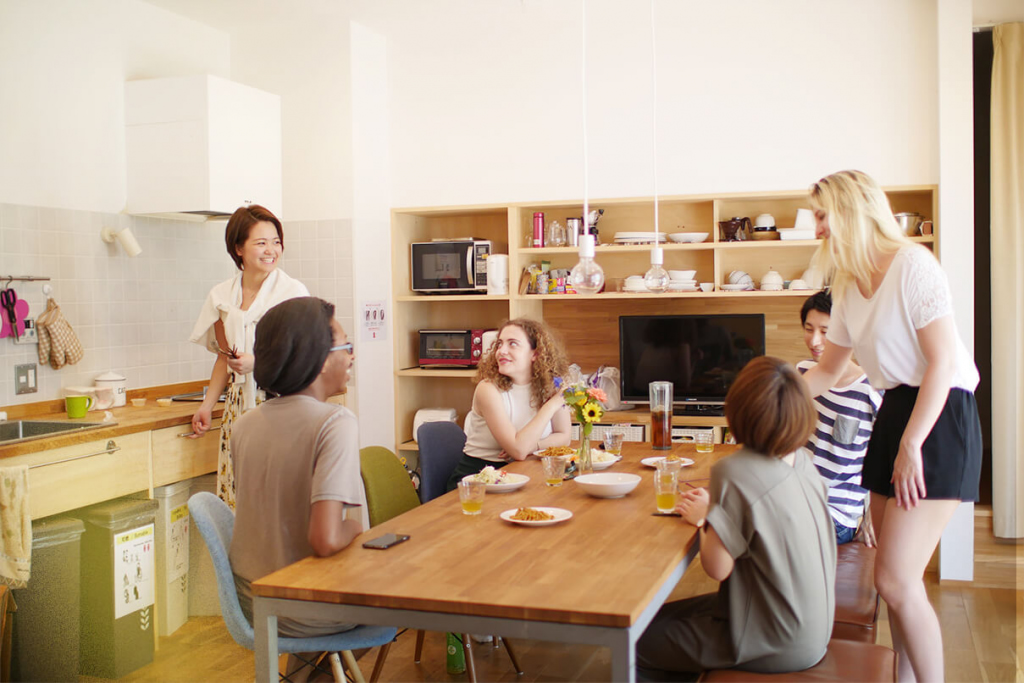Moving to Tokyo means not only bright city lights, 24-hour convenience stores and delicious ramen shops around every corner, but the unfortunate high cost of living. Luckily share houses offer a cheaper and easier alternative to regular rental apartments in one of the most expensive cities. On the other hand, the large array of options online makes the process of finding a suitable space to live a daunting task, especially for those already inundated with the responsibilities associated with the rest of the immigration process.
A share house is a rental space where residents stay in private or shared rooms. They may share a bathroom, living room and kitchen. Depending on a tenant’s preferences, they can decide whether they want to stay in a co-ed or same-gender only share house.

Share houses are a popular choice for students and young professionals from Japan and overseas since they have lower initial and monthly costs than regular rental apartments. Initial costs of regular apartments usually include key money worth one or two months of rent, a security deposit also worth one or two months of rent, a fire insurance fee, a guarantor fee, a real estate brokerage fee and a key exchange fee. While regular apartments may not include gas, water, electricity and internet in the rent, share houses usually include all utilities.
Rent ranges depending on location with some share houses costing only ¥30,000 per month. They also typically come fully furnished with a bed, desk, chair, mini-fridge and closet. The shared kitchen also usually has utensils and appliances. Share houses usually have washing machines and occasionally dryers.
Pros of Staying at a Share House
Selen Dogan, a student at the Waseda Graduate School of Asia-Pacific Studies, heard about her share house agency GGHouse from another MEXT scholarship student, Metha Pupri. Pupri recommended the agency after she did research online and discovered it was cheaper than other popular agencies such as Sakura House and Oakhouse.
“If you stay longer than three months then you also don’t need to pay the first month’s rent. I was coming from Turkey to Japan so I had limited budget in the first month, so it was a good deal,” says Dogan.
For those coming to Japan for the first time, share houses also offer a chance to meet new people. While some like Kamikita House cater to those looking to make friends of similar interests like cooking, sports or language-learning, others are more general in allowing people from different countries to meet each other. They also provide a sense of security for those worried about living abroad alone, accidents at home or possible natural disasters like earthquakes.
“I’m glad to be in a share house because you’re still able to interact with people and it’s not as lonely as living in an apartment by yourself. And it’s reassuring sometimes to know there’s someone upstairs if ever you’re in need of help,” says Yumi Mathias.

Courtesy of Netflix
On the other hand, the experience of interacting with other tenants varies depending on which share house agency people choose. Some, like Oakhouse, organize events and clubs for the residents. While Luisa Pischulti, a Waseda Graduate School of Asia-Pacific Studies student, regularly hangs out with some of the tenants at her share house owned by BeGoodJapan, Dogan and Pupri rarely interact with their neighbors at their GGHouse share houses unless they need to inform them of irresponsible behavior.
“When we want to say something to other tenants there is a whiteboard so we can remind each other to comply to share house rules. For example, when someone just leaves their trash in the kitchen, not in the garbage can, we just remind them using a whiteboard without using their full name,” says Pupri.
Mathias’ situation differs, since she stays in a literal house, unlike a renovated dormitory, owned by a local real estate company that markets both regular rental properties and share houses. Her schedule doesn’t align with her three roommates, so they rarely interact. Her interactions with her landlords have been positive too.
“I think I got really lucky. The owners here are very kind and they come by once a week and always give me sweets. Last time I was sick and they gave me homemade soup,” says Mathias.

Cons of Staying at a Share House
Mathias’ traditional Japanese sliding-door closet in her ¥50,000 share house in the suburbs gives her plenty of storage space. On the other hand, Dogan’s rent is cheaper at only ¥45,000 a month at a location only a few stops away from her campus at university, but she struggles with storage space in her tiny room.
“I somehow manage to do it but my room is super messy because I just store things wherever I can,” says Dogan.
Share houses typically have cleaners who come once a week to clean the hallways, shower rooms, kitchens and living rooms. On the other hand, it may become unhygienic in some shared living spaces throughout the week.
“Someone comes every week to clean, but sometimes tenants don’t tidy up after themselves or sometimes the showers are full of hair and stuff like that so that annoys me a little,” says Pischulti.

Recommended Share House Agencies
In the end, the tenant’s experiences differ depending on their share house criteria and the kind of tenants in their building. To assist in the share house search, here are some of the most trusted agencies in Tokyo.
1. GGHouse
According to its website, GGHouse owns 638 properties and 8,502 rooms in Tokyo, Saitama and Kanagawa. It offers discounts for tenants who stay longer than three months. If they stay longer than that time period, then they get one month rent-free, making this a good deal for those on a tight budget. The application process is quick as well. After contacting GGHouse about a property and move-in date, interested tenants complete an interview. After that, they sign a contract and can pre-reserve a room. They must pay within three days of being confirmed for pre-reservation. Then, they must attend an orientation at GGHouse’s Nippori office after arriving. The minimum contract period is one month.
2. Oakhouse
For those looking for a more social environment, they should consider Oakhouse. Oakhouse sets up meet-up events regularly on its website for tenants interested in meeting new people from other Oakhouse properties and participating in fun cultural activities. Established in 1992, Oakhouse now has properties in prefectures throughout Japan, including Kanagawa, Saitama, Chiba, Kyoto, Osaka and Hyogo. In addition to regular apartments and share houses, it also offers social residences for people with skills or talents to live together and hold workshops, seminars and other events.
3. BeGoodJapan
Established in 2006, BeGoodJapan often offers properties targeting international cultural exchange. It has Japanese, English and Chinese-speaking staff and 70 percent of residents are from overseas. Unlike other agencies, BeGoodJapan’s properties always include a communal space for residents to interact. Most properties are located in Tokyo, but it also has a few in Yokohama and Saitama. These properties require a guarantor unlike OakHouse and GGHouse.
4. Local real estate agency
Those able to read Japanese should consider using a share house site in Japanese like hituji.jp to find a share house owned by a local real estate agency. English-language, foreigner-targeted websites may not include every share house available. They may also offer higher rent than local real estate companies that own share houses and not have as many options or locations.
Related Posts
- Tokyo Life: 1 Month Living in Kamikita House
- “There Were Days When I Didn’t Want to Go Home”: Sharehouse Nightmares From Japan
- Painting Through the Pain with Violetta Polt
Updated On March 26, 2024








